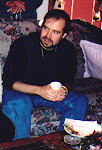Monday, August 9, 2010
Hellhound on His Trail
"It seemed like he reached down and pulled everything out of his heart." ..."I was full of joy and determination. Wherever King was, I wanted to be there. It seemed to me from where I was sitting, his eyes glowed." -- Witnesses to MLK's last speech, featured above.
I very much enjoyed reading Hellhound on His Trail, by Hampton Sides. The book details seemingly every fact known about the assassination of Dr. Martin Luther King, Jr.
The clip I embedded above is footage of a speech Dr. King gave less than 24 hours before he was murdered. He gave this speech without notes during a heavy storm. His mood had been depressed and he was searching for a second wind. The prospect of assassination seemed ever present.
Hampton Sides explores first the stalking of Dr. King by J. Edgar Hoover and the FBI, then the stalking of Dr. King by James Earl Ray and, finally, the stalking of James Earl Ray by the FBI. The story is one of intrigue, and is written in a novel-style. The hunt for James Earl Ray is a lesson in police investigation and in evasion.
The following elements (among others) led authorities to Ray: Dry cleaning tags, fingerprints, receipts, eye-witness accounts, an oil-change sticker, a bar tending school photo, Royal Mounted Police, Scotland Yard, hair samples and more man hours than you can imagine considering all this was done without computers.
Some highlights from the book:
-- Dr. King: "Each of us is two selves. The great burden of life is to always try to keep that higher self in command." This quote just rocks.
-- Dr. King (again): "We must learn to live together as brothers or we will perish together as fools."
-- Jesse Jackson embellished his involvement at the moment King was shot. He hired a public relations agent and was on the Today Show the next day. To be polite, I'll just say other Civil Rights leaders "disagreed" with his story. I'll let James Bevel tell the other side of the story:
"To prostitute and lie about the crucifixion of a prophet within a race for the sake of one's own self-aggrandizement is the most gruesome crime a man can commit." James Bevel. Lets just say Rev. Jackson isn't a hero in the book.
-- From President Lyndon B. Johnson on the rioting in response to the murder: "What did you expect? I don't know why we're so surprised. When you put your foot on a man's neck and hold him down for three hundred years, and they you let him up, what's he going to do? He's going to knock your block off."
-- James Earl Ray: "I should have pulled a holdup in Canada. That's where I made my mistake. I let myself get on that plane to London without enough money to get where I intended to go."
-- James Earl Ray, who was an escapee from prison before he killed King, told other inmates that killing Dr. King was his "retirement plan." If I ever get to the streets, I'm going to kill him." This statement didn't do a thing to stop conspiracy talk.
-- James Earl Ray made some very foolish mistakes. Those include these two gems: 1) While trying to rob a jewelry store in London to supplement his dwindling cash supply, the owner's wife, a lady in her late fifties, jumped on his back. Her husband then wrestled him to the ground and struck him several times. Ray fled. 2) He robbed a bank in London only to trade a perfect thumb-print matching the one found at the crime scene and on the weapon for 95 pounds cash. Oops.
-- Wait, that isn't close to the dumbest thing Ray did. While in custody awaiting extradition to the US, "Ramon George Sneyd" ranted about how he never met "this guy Ray" and how they absolutely had the wrong guy. After Ray calmed down and the British officer asked if they could do anything for him while he awaited extradition, he asked that his brother be notified. The agent said he would do that and asked for contact information. Ray's response?
"Oh, he lives in Chicago. His name is Jerry Ray."
D'oh!
Conspiracies
Obviously, people don't need much help concocting conspiracies. But, if you read this book and care about evidence, you really would have a hard time concluding anything other than that Ray worked alone. Conspiracy theories ranged from the FBI to militant black groups to communists to the mafia and to Southern racists.
My theory? People just don't like it that one nut can do so much damage by doing something rash. Based on the physical evidence presented in this book, you'd have to be looking for a conspiracy and determined to find one to conclude otherwise.
Overall, this book reads like a crime thriller, but it also maintains credibility as a legitimate work of non-fiction. The PBS documentary "American Experience: Roads to Memphis" is featured below and follows much of the book. I recommend this book highly.
Subscribe to:
Comments (Atom)




